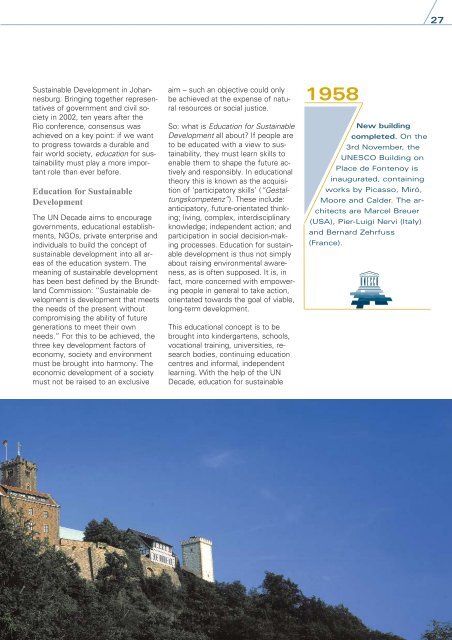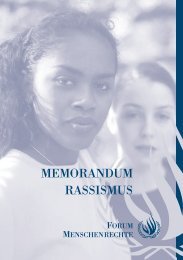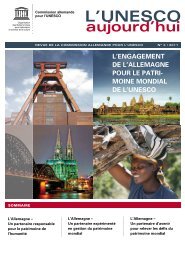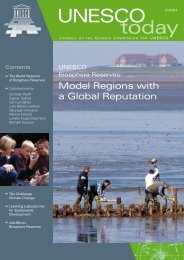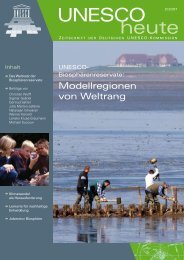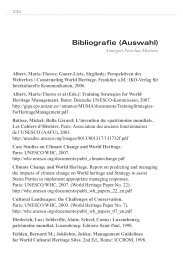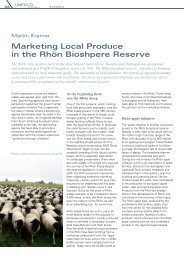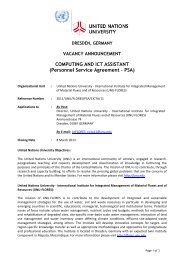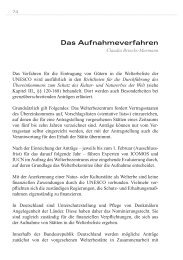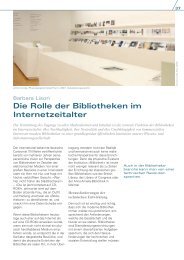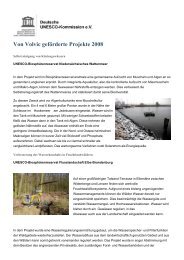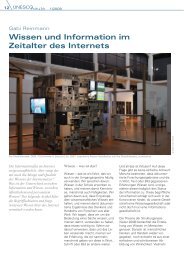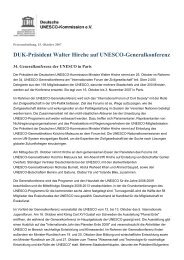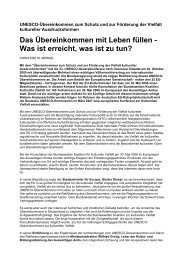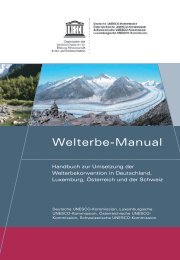Download - UNESCO Deutschland
Download - UNESCO Deutschland
Download - UNESCO Deutschland
You also want an ePaper? Increase the reach of your titles
YUMPU automatically turns print PDFs into web optimized ePapers that Google loves.
Sustainable Development in Johannesburg.<br />
Bringing together representatives<br />
of government and civil society<br />
in 2002, ten years after the<br />
Rio conference, consensus was<br />
achieved on a key point: if we want<br />
to progress towards a durable and<br />
fair world society, education for sustainability<br />
must play a more important<br />
role than ever before.<br />
Education for Sustainable<br />
Development<br />
The UN Decade aims to encourage<br />
governments, educational establishments,<br />
NGOs, private enterprise and<br />
individuals to build the concept of<br />
sustainable development into all areas<br />
of the education system. The<br />
meaning of sustainable development<br />
has been best defined by the Brundtland<br />
Commission: “Sustainable development<br />
is development that meets<br />
the needs of the present without<br />
compromising the ability of future<br />
generations to meet their own<br />
needs.” For this to be achieved, the<br />
three key development factors of<br />
economy, society and environment<br />
must be brought into harmony. The<br />
economic development of a society<br />
must not be raised to an exclusive<br />
aim – such an objective could only<br />
be achieved at the expense of natural<br />
resources or social justice.<br />
So: what is Education for Sustainable<br />
Development all about? If people are<br />
to be educated with a view to sustainability,<br />
they must learn skills to<br />
enable them to shape the future actively<br />
and responsibly. In educational<br />
theory this is known as the acquisition<br />
of ‘participatory skills’ (“Gestaltungskompetenz”).<br />
These include:<br />
anticipatory, future-orientated thinking;<br />
living, complex, interdisciplinary<br />
knowledge; independent action; and<br />
participation in social decision-making<br />
processes. Education for sustainable<br />
development is thus not simply<br />
about raising environmental awareness,<br />
as is often supposed. It is, in<br />
fact, more concerned with empowering<br />
people in general to take action,<br />
orientated towards the goal of viable,<br />
long-term development.<br />
This educational concept is to be<br />
brought into kindergartens, schools,<br />
vocational training, universities, research<br />
bodies, continuing education<br />
centres and informal, independent<br />
learning. With the help of the UN<br />
Decade, education for sustainable<br />
1958<br />
New building<br />
completed. On the<br />
3rd November, the<br />
<strong>UNESCO</strong> Building on<br />
Place de Fontenoy is<br />
inaugurated, containing<br />
works by Picasso, Miró,<br />
Moore and Calder. The architects<br />
are Marcel Breuer<br />
(USA), Pier-Luigi Nervi (Italy)<br />
and Bernard Zehrfuss<br />
(France).<br />
27


